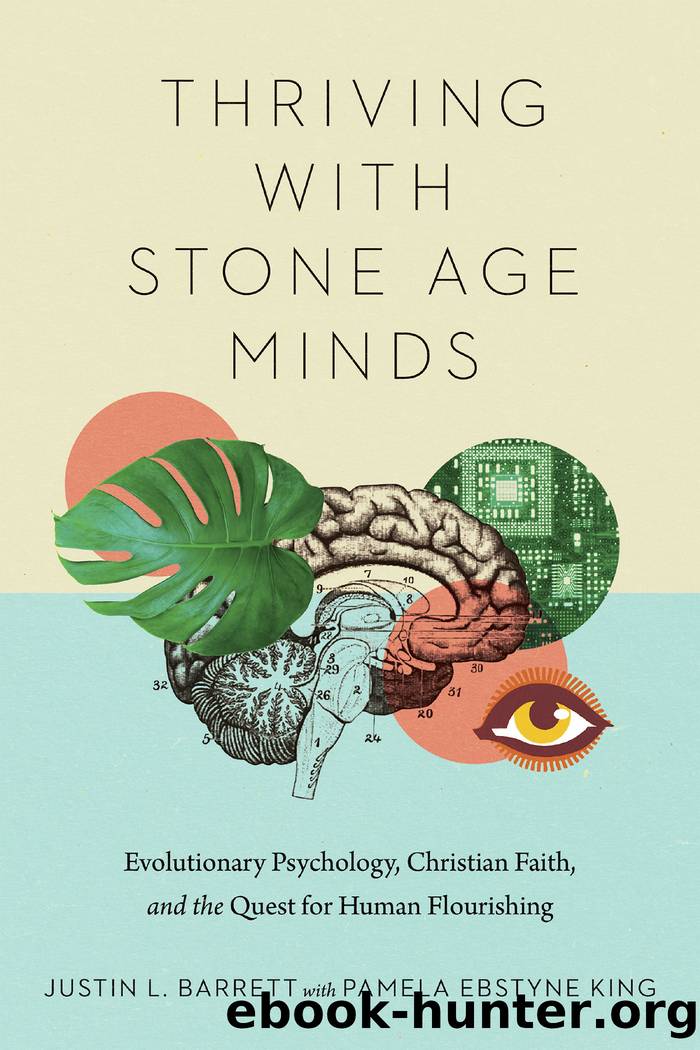Thriving with Stone Age Minds by Justin L. Barrett;Pamela Ebstyne King; & Justin L. Barrett & Pamela Ebstyne King

Author:Justin L. Barrett;Pamela Ebstyne King; & Justin L. Barrett & Pamela Ebstyne King
Language: eng
Format: epub
Tags: Evolution;creation;evolutionary creation;evolutionary psychology;evolution of the brain;theistic evolution;Christian evolution;science;creation science;Christian scientist;Christianity and science;Christianity and evolution;creationism;evolutionism;nature nurture;human evolution;human purpose;imago Dei;created in the image of god;human species;homo sapien;intelligent design;survival of the fittest;Darwinism;Biologos;science and faith
Publisher: Inter-Varsity Press
Published: 2021-04-28T10:51:07+00:00
THE SELF-CONTROL GAP
Self-control, understood broadly, enables us to choose among competing motives, override or tamp down undesirable impulses, or amp up and act on impulses or convictions that are weaker than we would like them to be. Self-control includes deliberately regulating emotions. Self-control is a bit like a muscle that is used in many different domains. Like a muscle it needs exercise; we need practice exercising control over ourselves by making tough choices, overriding impulses, or acting when a big part of us does not want to. But this muscle can be ineffective from underuse and also from being placed in situations in which it is almost doomed to fail.
Our special form of sociality, the acquisition of information, and self-control have together enabled us to build contemporary human niches with all of their wonder and complexity. It may be, however, that for all the good our self-controlled human nature brings about, it sometimes changes our niche such that new challenges for self-control and virtuous decision-making arise. Take time-based punctuality as an example.
As far as we know, since there have been humans, humans have had to exercise self-control to do things âon time.â If you were an angler, you might have had to be out fishing before the warmth of the day drove fish to deeper water. If you were gathering, you might have had to get the acorns before the deer and wild turkey got them. As a horticulturalist or farmer, getting seeds in the ground early enough (but not too early) was a key to harvest success. Likewise, being âon timeâ might have involved getting to shelter before a storm or securing supplies before night-time scavengers were out. But in these sorts of examples, being âon timeâ is tied to clear cause-and-effect outcomes and related risks and rewards. As the saying goes, âThe early bird gets the worm.â This kind of punctuality is easily motivated. Many animals do something like it.
At some point in our human past, however, our ancestors discovered the utility of using our ability to be punctual to solve problems for which the timing was more arbitrary. Coordinated activities could be linked to a time of day or phase of the moon for the sake of efficiency. Saying, âLetâs meet when the sun is at its highest point the day after the moon is newâ can clarify more precisely when it is that a group is meeting up for some activity, thus reducing the waiting time and associated costs. However it came about, punctuality surely played a role in solving large-scale coordination problems and became regarded as a virtue in some human groups. Our self-controlled nature was harnessed to solve niche-related challenges through punctuality. A byproduct, however, is that in the human societies most of us now live in, being âon timeâ is no longer an extra tool to use when itâs helpful but a social or even legal requirement. And the technologies for telling time of day, day of the week, and month of the
Download
This site does not store any files on its server. We only index and link to content provided by other sites. Please contact the content providers to delete copyright contents if any and email us, we'll remove relevant links or contents immediately.
Sapiens: A Brief History of Humankind by Yuval Noah Harari(13053)
The Tidewater Tales by John Barth(12030)
Do No Harm Stories of Life, Death and Brain Surgery by Henry Marsh(6336)
Mastermind: How to Think Like Sherlock Holmes by Maria Konnikova(6236)
The Thirst by Nesbo Jo(5785)
Why We Sleep: Unlocking the Power of Sleep and Dreams by Matthew Walker(5642)
Sapiens by Yuval Noah Harari(4537)
Life 3.0: Being Human in the Age of Artificial Intelligence by Tegmark Max(4507)
The Longevity Diet by Valter Longo(4445)
The Rules Do Not Apply by Ariel Levy(3906)
The Immortal Life of Henrietta Lacks by Rebecca Skloot(3826)
The Body: A Guide for Occupants by Bill Bryson(3801)
Why We Sleep by Matthew Walker(3772)
Animal Frequency by Melissa Alvarez(3755)
Yoga Anatomy by Kaminoff Leslie(3701)
Barron's AP Biology by Goldberg M.S. Deborah T(3632)
The Hacking of the American Mind by Robert H. Lustig(3580)
All Creatures Great and Small by James Herriot(3516)
Yoga Anatomy by Leslie Kaminoff & Amy Matthews(3396)
